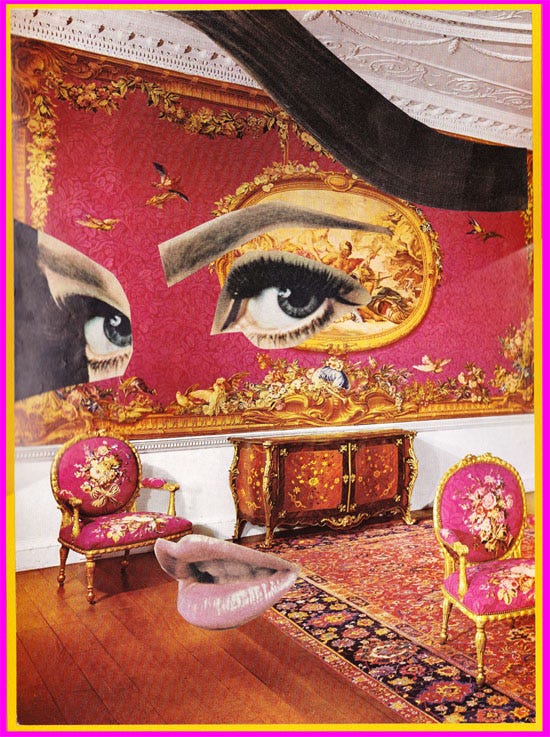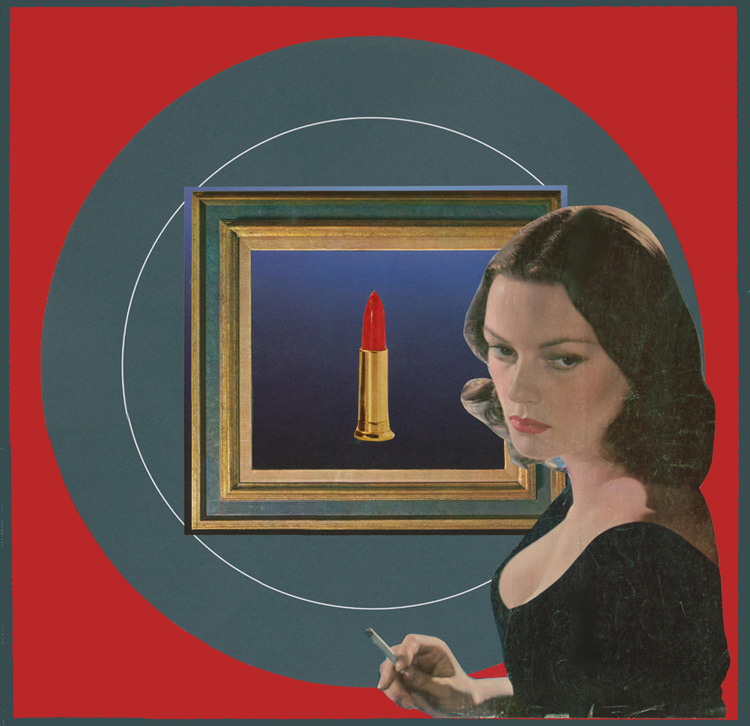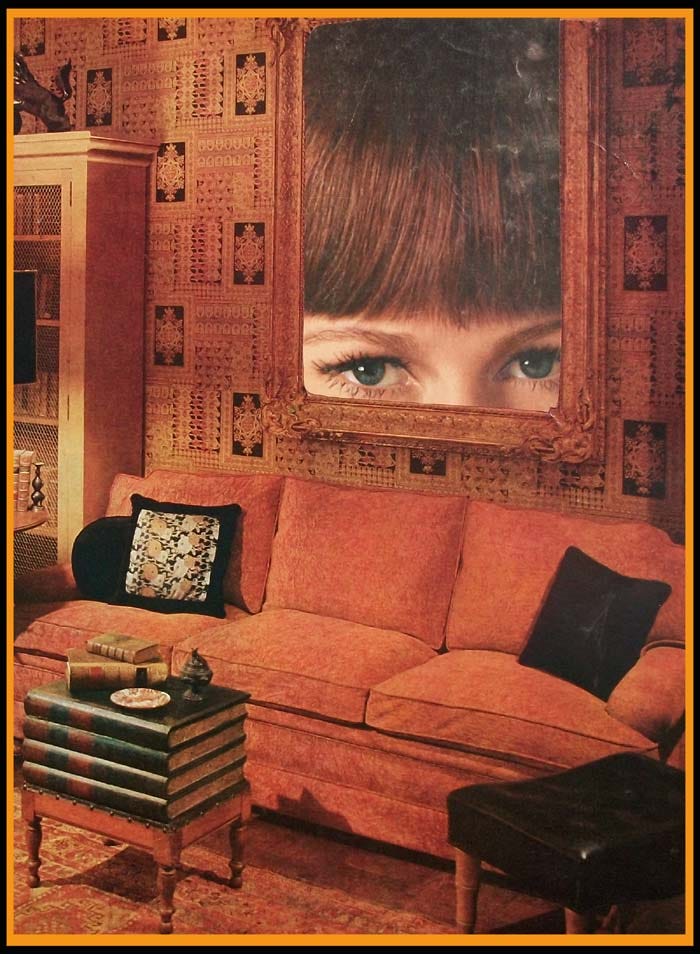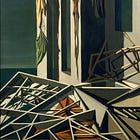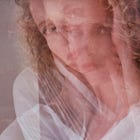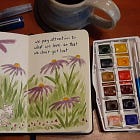Art+Psychology Interview with Photomontage Artist Eva Lake
"I like passion. I love it when artists open their own spaces, even if they are short-lived. You create conversation, own your stuff and shift power."
This interview was originally published in 2016 by Fempotential. It has not been updated before re-publication and we should not presume that the artist feels the exact same way about everything today. Humans change and grow. Regardless, the words and work are powerful.
Eva Lake is a multi-media artist who began making punk art zines and installations in the 1970s and has been exhibiting her work in various forums for more than 30 years. Over the years she has worked in the makeup and fashion industry, as an art interviewer for radio, as a writer working on art features, as a singer in post-punk bands and New York musicals, and as an exhibition curator, all the while making her own visual art. Her art, primarily in photomontage, explores themes of women and their shared narratives.
Kathryn: How did you come to be an artist?
Eva Lake: I didn’t really make a decision to be an artist. It was always there. In 4th grade I was already “the class artist.” Plus my mother was an artist. It was really like art chose me, not the other way around. Having said that, though, art is many things – a way to live, a way to think. There were eras in my life when I was talked out of art, sort of bullied out of it. There were also times when I had to work so much in a day job that art-making was this private affair, not something shown and discussed. It has ebbed and flowed over time.
“I recall a fellow artist once telling me that beauty was dangerous. I knew this to be the truth in painting, but I also felt it was the case in many other things, including women. What I want to do with beauty and glorious artifice is put her where you least expect her to be. She’s often shoved into a box and I want to bust her out. She’s the ocean, the sky, the forest. She’s the skyscraper, the Pantheon, the illuminated manuscript. She’s also the wall, the decor, the carpet you step on. A girl from Southern Oregon, gazing down a muddy dirt road. She’s the mover in art history and the genius of the crime.” - Excerpt from artist’s statement for Anonymous Women.
Kathryn: You have been exhibiting your work for a long time. What changes have you seen in art viewing over the years?
Eva Lake: In general I would say that showing is more and more “professional,” more and more about talks and statements and critical theory. That’s okay, but I like passion. I love it when artists open their own spaces, even if they are short-lived. You create conversation, own your stuff and shift power.
Kathryn: How has your work intersected with the different places where you have lived over the years?
Eva Lake: The London punk and post punk scene of the late 70’s probably sealed the deal for me as a collage artist. In the 80’s both San Francisco and New York City fed this Romantic identity I had as an artist. And you need Romance if you want to remain one; you can’t just do it for the hope of money or fame.
The thing about Portland, where I live now, is that I could never disappear into dead artists, because we do not have endless, amazing museums. (I miss them often, especially the Met!). But that means that Portland demands you deal with the living, with the now. So I have made more work here than anywhere else.
“In the early 80s the work, like the music subculture of the time, took a turn towards New Romanticism. I worked in a record store in San Francisco and my work was influenced by music and old novels.” – Excerpt from the artist’s description of her Photomontage work.
Kathryn: Do you work in a studio space?
Eva Lake: My studio has been all over the map, in all kinds of places, but I completely relate to the “Cut with a Kitchen Knife” idea of Hannah Hoch. Sometimes all I had was a bedroom. One thing I would like to say to any artist just starting out is that art making is not just limited to hours in a studio and an object made. Having some grand studio doesn’t make you an artist.
Kathryn: What was the favorite of all of your own exhibits?
See Eva’s impressive exhibition history here.
Eva Lake: It is easy to name my favorite shows. First: my first solo, which was in San Francisco in 1980 at the Goodman Building. Jean Pauline, legendary anarchist and feminist from Modern Times bookstore, recommended me to that place. I hung that show, sat at that show, with no expectations. Every day was a ride and a wild conversation. I don’t think I even had prices or wall labels. The crowd, the freedom, being an unknown: San Francisco gave me that. It’s worth mentioning that the show was called “Photomontage etc.” – because I still am all about that, even the “etc.”
And my other favorite exhibition was “Targets” in 2010. Targets and famous women have been on my mind since the 70’s, since my first collages in high school, and I finally made a cohesive body of work around them. Then I had to fight to show them. When they did show, it was a breakthrough moment for me and I owe a lot to certain unnamed key figures.
“By the time I was thirteen, I was firmly entrenched in the worldwide craze of “nostalgia” – especially anything to do with the beautiful and complex women of Hollywood and the fashion industry. At the same time, I was brought up by a woman artist who loved cosmetics and glamour. All of these things fed into my idea of what a woman artist’s life was like – she makes objects but she’s also the object. The conversation is as much about her, her body, how she looks and how sexy she is – as it is her work.” – Excerpt from Artist Statement about Targets
Kathryn: How does womanhood / feminism impact your art?
Eva Lake: My art was feminist before I ever considered the word or the practice. What I mean by “feminist” here is a woman simply telling the story from her own view, her own gaze. That’s a start for all feminist art. My first ever collage, made in high school, is of Lucy. That woman had brains, power, ideas, beauty, everything. Pain too. I was looking at all of those things but it’s not like I had words for it at the time. Nowadays I’m thinking that having a female view is a way to make an advance in art history. It’s exciting actually. A lot has not been in our hands. I feel incredibly free to follow my own amusement and while I have that voice I matter, I can contribute.
“One man said he didn’t like certain subjects I had used, certain women he personally did not like. But I then wondered – was this a bad thing? Why do we have to like the women? Why do they always have to please? It’s assumed that she looks good because she wants to please you, to serve. That may be far from the case.” – Excerpt from interview with Eva Lake by Richard Schemmerer
Kathryn: How do you prepare to give an artist talk at one of your exhibitions?
Eva Lake: My preparation just depends on the exhibition at hand. Sometimes I prepare a lot, sometimes not so much. Things go in cycles. Sometimes you think you have arrived but you are just starting out! I’ve had shows with performances and poetry readings and art noize bands instead of “artist talks”.
Kathryn: How does being a diarist intersect with the rest of your life as an artist?
Eva Lake: The diary has meant different things at different times of my life. Inspired by Anne Frank, I started at age 12 and had no great ambitions. It was just about writing, maybe keeping my own company. I was an only child, out in a rural area and my dad had just died. For years I hated how I wrote and couldn’t read it, but around 2000 I changed my tune. My younger self tells me things I need to remember. Your voice changes and it is nice to have the record of that.
Kathryn: What advice would you offer to a young woman just beginning her journey as an artist?
Eva Lake: I remember a quote from Bill Ball of the American Ballet Theater from decades ago, something to the effect that:
“Artists have to work all of the time, that way the best gets tossed out like everything else. It’s all just work.”
I agree with this. You make it but you don’t often know what is good or important. Make it anyway. Don’t always create for shows or galleries – make for yourself. Engage yourself.
Which leads me to the next thing: don’t listen to many people, especially men. I really hate to say that, but the system is very competitive and built on keeping others out. I have seen it way too many times. So don’t take their advice!
And finally: build your own system if you can. My punk and post-punk era is what brought me to this conclusion. Want to get a show? Give a show. Make it about somebody else every now and then. It’s a really powerful way to live.
Kathryn: How do you keep making work in the face of criticism from others?
Eva Lake: I do not really think about what people will take away from my work. Part of the reason for this is because I have shown a long time and people have said all kinds of weird things. I was often surprised. You grow up in public and change your mind. And you make the work but you don’t really own it. Having this attitude also helps with the ups and downs of being an artist. It’s a life, not an object. I’ll defend my life but not necessarily the things themselves.
Kathryn: You worked for years interviewing other artists. How did that work intersect with or impact your own work? What did you learn from conversations with other artists?
Eva Lake: Interviewing artists on the radio gave significant things. First, there was the backstory, what people said off the mic. Everyone is so politic on record. Off the record is so much better! Second, I learned about how the art world was relayed and built via the press release. All of a sudden, all of these galleries were sending me their PR and artists were sending me their statements. What an education! And third, when you are around all of those artists, you just up your game. You can’t help it. It’s not about influence or even being inspired; you’re just walking and literally taking art and ideas all of the time.
If you have read this far, remember that writing takes much longer than reading. Support the work by paying for it. My Sliding Scale annual rate starts at $10.

